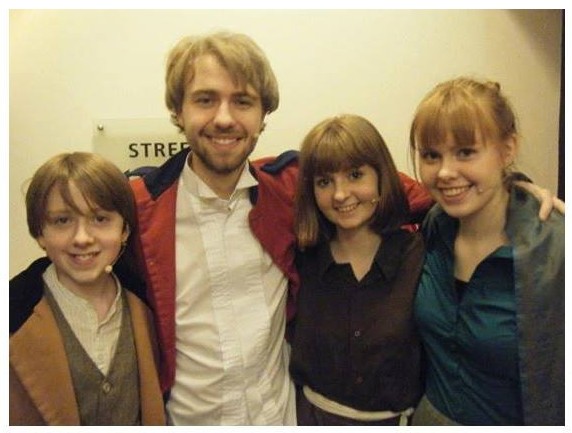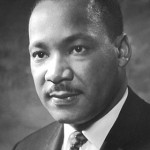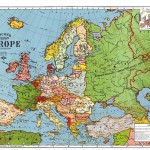Sorry for the hiatus, everyone – I’ve been away playing Inspector Javert in a youth theatre production of Les Miserables.

Enough has already been written about Les Miserables as a story (and it is indeed A Great Catholic Novel), that I feel I have little to add: I recommend Leah Libresco’s posts on Inspector Javert, which I ended up using as research materials for playing the part.
On the final night of the show I spent a lot of time just watching the rest of the cast from the wings, listening to the singing and the instrumentation, trying to drink it all in for the last time.
And that got me thinking about Les Miserables as Les Mis – as a musical. What does the story of the novel gain in being sung?
Chris Holland, who was the Valjean alternate in the West End for two years, and very generously gave our cast a workshop, told me that the play’s status as a musical allows it to more effectively condense the 1000+ page novel into two-and-a-half hours on stage. Thus Javert’s peculiar mixture of repressive rigidity and savage joy, his glorious small-mindedness, which is conveyed across pages and pages of description, thought, narration and action in the book can be conveyed to quite an impressive degree** in one song, Stars.
Music, when paired with narrative, is also an intensifier. I’m reminded of something my sister once said about bombastic fight scenes, those perennial and much-derided features of summer blockbusters. Yes, they can be so much sound and fury, merely time-filling spectacle. But fights can also throw an emotional, philosophical or character-based conflict onto a larger canvas. The visceral, earthy fist-fights between Batman and Bane in the Dark Knight Rises capture something of Bane’s matter-of-fact brutality, of Bruce Wayne’s brokenness and exhaustion, and of both men’s determination to mold themselves, body and soul, into tools to be used to advance their clashing visions. A song does something similar. Maybe it’s not subtle – but it’s damned effective.
Even when music isn’t the main focus in a film, a score can have a similar intensifying effect. It’s like the storytelling equivalent of salt on a meal (and it doesn’t just have this effect on stories either: just look at the abundance of Tumblr posts imbuing fairly trite song-lyrics with truly awesome significance).
In the words of Noel Coward: “Extraordinary how potent cheap music is.” Music is an emotionally rich medium: people often talk about music “elevating” us, but in reality that’s only one of the things it does – it can sadden, horrify, and shock as well as uplift.
When attached to narratives, music can also employ its quality as a memory sponge. You know how hearing a pop song brings you back to a particular summer? It does that with stories, too.
I will forever associate The Chronicles of Thomas Covenant the Unbeliever with Mike Oldfield’s Incantations, and be unable to hear Keane’s The Frog Prince without reliving the Battle of Hogwarts. When a story has its own music, that helps to create its own rich, deep atmosphere.
In fact, I’ve long believed that being able to attach music to stories is one of the few advantages that film, TV and video games have over books. The mind will always win at special effects (I defy anyone with a functioning imagination to read the climactic chapters of Brandon Sanderson’s recent fantasy novel Words of Radiance and tell me that a film could beat them for spectacle) and usually does a pretty great job at acting and directing. But unless you’re some kind of astounding instant composer, your mind can’t give a book a soundtrack. Perhaps the most lasting contribution the Lord of the Rings films have made to the sub-creation of Middle Earth is Howard Shore’s wondrous score.
The question seems obvious: why the hell does music do all this?
Nobody really knows how the human ability to make and enjoy music evolved, never mind why it has these bizarre, complex relationships with memory, emotion and storytelling. And yet we’ve all experienced the weird magic of music. It’s of varying importance in different people’s lives, but you’d have to search for a very long time to find someone who was never moved by a piece of music (when I was little I used to pretend I didn’t like music – but in reality I would press my Gameboy to my nerdy little ear and thrill to Pokémon chiptunes).
The science of our brain’s relationship to music, endlessly fascinating as it is, is almost beside the point. The experience of music itself, and the transcendence that often goes with it, should be enough to make us wonder, to make us marvel.
There are two kinds of worldview: the kind that takes the human experience of music (and art, and beauty) seriously, trying to engage with it as it is; and the kind that tries to explain it away. This isn’t about being a believer or a sceptic: it’s about making a serious attempt to grapple with the human condition. Adam Frank, an atheist, recently wrote about his awe at the natural world:
For me, that sense of awe is an elemental encounter with the world. It comes before we decide to parse it into our particular choices of ontological commitment as in “I’m an atheist” or “I am religious.”
At its most powerful, the experience of awe is a startling, breath-taking moment that shatters identity.
More important, it’s in response to those profound experiences of awe that we are often set on our paths to know more. That is why Eliade spoke of these experiences as a kind of power.
Thus it is in response to the experience of awe that we are set on the road to science or the road to spirituality. In that way, you can just as easily ask, “Is the awe of the religious really just scientific response?” as you can ask, “Is the awe of the atheist really a religious response?” In all cases, the significance of this “oceanic feeling,” a term Sigmund Freud popularized, is that it’s pre-scientific and pre-religious. It comes before we opt for explanations of any kind.
That awe can be experienced in nature: but it can also be experienced when listening to Mozart, or U2, or Bring Him Home from Les Miserables. And it’s these experiences of awe, which have nothing to do with power, status, the urge to survive or to reproduce, that human beings seem to value as among the most important, the most meaningful we ever have.
Any worldview, any philosophy, any account of existence that doesn’t try to engage with that fact is not merely wrong: it’s not even at the races.












